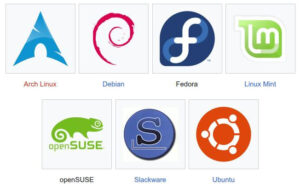FOSS Week in Review
We’re just barely past the relatively quiet news days that are the holiday season and already the news is getting to be quite contentious. So much so that I’ve been tempted to call this edition of the Week in Review “The Good, the Bad and the Ugly,” but I’m afraid that might turn into some kind of trademark dispute. I am reminded by our opening story, however, of the old Pogo quip from the funny pages: “We have met the enemy and he is us.”
 Linux Foundation adopts plantation model: The biggest FOSS story this week came on Wednesday when free software activist and Linux kernel developer Matthew Garrett made public that on last Friday the Linux Foundation had dropped community representation from its board.
Linux Foundation adopts plantation model: The biggest FOSS story this week came on Wednesday when free software activist and Linux kernel developer Matthew Garrett made public that on last Friday the Linux Foundation had dropped community representation from its board.
The Linux Foundation’s board has always been weighted heavily in favor of corporations and money, with a large majority of the foundation’s board being elected by member corporations. The nine platinum members, who each pay $500,000 yearly in membership dues, elect up to ten board members (or one each for up to ten directors), the sixteen gold members elect three, and the more than 250 silver members elect only one. Until last week, individual members, who pay $99 in annual dues, elected two members to the board, not enough to influence foundation policy in a vote, but enough to give the community some say in the decision making process.
Not any longer.
“The by-laws were amended to drop the clause that permitted individual members to elect any directors,” Garrett wrote in his blog. “Section 3.3(a) now says that no affiliate members may be involved in the election of directors, and section 5.3(d) still permits at-large directors but does not require them.”
So what happened to spark this move by the big money guys behind the foundation? Garrett offered an answer: “These changes all happened shortly after Karen Sandler announced that she planned to stand for the Linux Foundation board during a presentation last September,” he wrote. “A short time later, the ‘Individual membership’ program was quietly renamed to the ‘Individual supporter’ program and the promised benefit of being allowed to stand for and participate in board elections was dropped….”
The problem with Sandler, as the corporate bigwigs see it, is that she is the executive director of the Software Freedom Conservancy, a nonprofit organization that’s highly focused on enforcement of the GPL, and which is currently funding a lawsuit against Linux Foundation member VMware in a GPL noncompliance case.
“The timing may be coincidental,” Garrett continued, “but it certainly looks like the Linux Foundation was willing to throw out any semblance of community representation just to ensure that there was no risk of someone in favor of GPL enforcement ending up on their board.”
Today, Linux Foundation president Jim Zemlin addressed the issue in a blog post on the foundation’s website. He was tardy weighing in, he said, because he “had been engaged in meetings on behalf of The Linux Foundation in China, with limited access to email and/or Internet.” Upon his return to the wired world, he was shocked to discover the brouhaha that’s developed “in social media.”
“The Linux Foundation Board structure has not changed,” he wrote.
“[T}he Board voted to keep Larry Augustin and Bdale Garbee as individual At-Large Directors in recognition of their longstanding service to the community and individual commitment to helping advance The Linux Foundation.” His post fails to point out that at-large directors serve one-year terms, meaning they’ll be gone soon enough.
Stay tuned…
Welcome to the Brave new browser: On Wednesday we learned from The Register of a new browser called Brave, currently in beta, which takes a novel new approach to protecting users’ browsing history. While most browsers depend on implementation of “do not track,” which Google and Facebook reportedly ignore, Brave is taking another rout, by not giving tracking code your info period — sort of.
Although it’s being touted as an ad-blocking browser, that isn’t quite true, as the developers are quite aware of the fact that many sites, especially news sites, depend on advertising revenue to keep the bills paid. Instead, the browser will act as something of a gateway, watching browsing history, then fitting the user into a standardized advertising segment which it will provide to websites and advertisers, a service that the developers say will be paid for by advertisers. We’ll see.
Former Mozilla CEO and JavaScript inventor Brendan Eich is behind the project. Version 0.7 is available on GitHub.
Another day, another distro: The fourth update for Manjaro 15.12 (Capella) became available on Monday. According to the distro’s website, this update renews the manjaro-desktop-settings packages, and adds KDE Framework 5.18, KDE Apps 15.12.1, and some newer Deepin 12.15 packages to the distro’s repositories. … Speaking of Deepin, LinuxInsider reported on Monday that the OS has changed names and is now going by “Depth OS.” According to the article, this has led to some confusion: “It has had several names, including ‘Hiweed GNU/Linux,’ ‘Linux Deepin,’ ‘Deepin’ and now ‘Depth OS.'” Keep throwing names against the wall and eventually something will stick. … While we’re on the subject of name changes: We learned from Softpedia today that Chromixium, a Ubuntu based distribution designed to have the look and feel of Chrome OS, has also gone through a name change and is now Cub Linux. The change was brought about after Google objected to the old name and “asked” the project to find a new one.
Quick takes: As of Wednesday morning, Valve has hit a new milestone in its efforts to bring gaming to Linux, with there now being 1,800 Linux games available through Steam…. There’s a new head honcho at MariaDB, with Michael Howard, once the lead on the the data warehousing development crew at Oracle, taking the reins as CEO. The project also now has funding of $40 million.
One more thing: The FOSS Force 2016 fund drive has been stalled at $1,075, or 29 percent of our $3,700 goal, for a couple of days now. We really need to meet our goal if we are to continue. Ten bucks will buy you two cups of coffee at Starbucks that’ll be gone in an hour, if you’re a slow drinker. Can’t you contribute at least that much to help FOSS Force survive and grow? Please support us with your contribution.
Well, that does it for today. Until next time, may the FOSS be with you…
Christine Hall has been a journalist since 1971. In 2001, she began writing a weekly consumer computer column and started covering Linux and FOSS in 2002 after making the switch to GNU/Linux. Follow her on Twitter: @BrideOfLinux













Jim Zemlin stood in the main hall of the 2008 Linux Collaboration Summit and told Tom King and I, face to face, that Desktop Linux had no future within The Linux Foundation. The money was in server and support. The Linux Desktop was simply a byproduct of the thing that made them money.
Zemlin isn’t shy about it. The Linux Desktop isn’t of any interest to The Linux Foundation. It was that warm spring day that I understoood who was friend and who was not. It’s colored what I do and how I do it ever since. It’s no wonder that The Linux Foundation chose Goodwill to be their front man in Texas in the upcoming project planned between The Linux Foundation and Goodwill. And that’s fine with me. I can think of no other person or entitiy that I would avoid more in business associations than The Linux Foundation. There’s just some money that’s stinks too much to take.
How many of these companies support the BSA (Business Software Alliance)? They expect people to follow the licensing guidelines, under legal threat, yet they choose not to follow their own preachings?
The BSA is largely a front for Microsoft extortion.
Other complicit organizations include Intel, Oracle, Dell and more.
The Linux Foundation has revealed itself as nothing more than another corporate power play.
Oh please, listen to yourselves. Linux is licences under the GPL. That means it will always ALWAYS be free. Free to everyone, INCLUDING the community. Linux also needs money to survive. Just like ANY business platform. Without money, Linus himself would be working for someone or retired on the awards he’s been given. Corporations are the only ones with the money needed and the interest of pushing Linux development as fast as it’s moving. Do you really think that the 12 neckbeards in their closets are the ones that have gotten Linux to this point? Everyone is a sellout when it comes to money. I noticed that I had to scan past about seven ads to be able to make a comment on this post. If you really believed in freedom like you say you do, then why post all those ads? MONEY. We all need to eat, we all need to live. I am totally for the corporations being involved in the development of Linux. It’s them that will bring the change we’ve all wanted for two decades. If you don’t, then I hear there is a little tiny project called GNU that is working on a little tiny kernel called HURD or something. See how long it takes you to develop with them with no money.
Cory Hilliard – You are either being aive or an apologist, not sure which.
The GPL alone does not ensure freedom. Just ask the SFC…VMWare seems to think it is above the need to respect the license of the software it is clearly stealing, and it is a member of the Linux Foundation.
Hypocrisy is a useful tactic in corporations when they can get away with it because nothing matters as much as making as much money as possible.
Corporate development can speed things along, and is a necessary evil where driver support is concerned, but it should never be allowed to control the direction of development, or we will all be seeing ads shoved in our faces by “our” linux-based operating systems while “cloud” based systems steal away our privacy and hand it over on a silver platter to info-hungry companies and intelligence agencies.
Cory Hilliard writes:
It’s them that will bring the change we’ve all wanted for two decades.
For things I want to see developed on Linux, the corps. have proven themselves to be incompetent or unwilling, Witness the attitude of The Linux Foundation as related by Mr. Starks, or the poor quality of AMD graphics drivers, or the dumbed-down desktops developed by Canonical and Red Hat.
Linux needs good desktop applications like Krita. Important projects like that are usually developed by tiny groups of volunteers with no coroporate cash in sight.
Overall, the Linux ecosystem is in a tolerable state and if it continues to improve, slowly but surely, without the twisted political influence of money then so much the better.
Mike – I make no apologies for being a realist. Most of the distros out there are governed, created and rolled by corporations in one form or another. Almost all ask for donations or fees of some sort so that the people that are working on them can feed their families.
If you don’t like what you see, the GPL allows you to roll your own. So again, if you don’t like any of that, you’re free to work on HURD. Well as long as you like working for nicey feelies as pay.
Yes, it’s easy for everyone to make me the bad guy for stating the obvious. The fact is, you’re all welcome to put your money where your mouth is. Every day. If someone gave you a million dollars, would you be willing to give that money to the development of Linux? Honestly? You would just give your million to the development of a driver or two? Would you pay a couple of developers for a year or two to fix what’s broken?
OK let’s change the scenario, you’re the CEO of a corporation that has to answer to a board of directors or whatever. There’s one thing that you personally want to fix in Linux because it’s not working properly when you play solitaire… would you be willing to answer to that board for the money you spent on that fix? Would you be willing to risk your nice cushy job to make the world a better place for everyone?
@Cory Hilliard said “Most of the distros out there are governed, created and rolled by corporations in one form or another.”
That is blatantly false.
Even if we look at the bulk of distros as being derived from only a few bases: Of the three big bases Debian, Red Hat, and Slackware, only one is corporately controlled.
Among the derivatives, there are far more independent distros than there are corporate ones like OpenSUSE and Ubuntu.
Corporate improvements to Linux are far overrated. Their primary contribution is to device drivers for hardware they manufacture.
Desktop and application software is almost entirely volunteer based and is all the better for it.
Is Linux desktop dead then ? Will KDE give up development, will GNOME give up ?